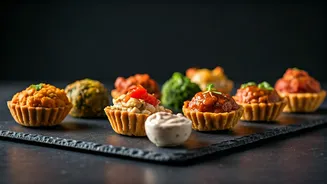Food Podcast Craze
Podcasts dedicated to food are enjoying a surge in popularity. This growth reflects a broader trend of people seeking accessible and engaging content.
The ability to listen while multitasking makes them convenient for busy lifestyles. They offer a unique format for exploring culinary topics, from expert interviews to in-depth discussions. Listeners can gain practical cooking tips, discover new cuisines, or simply enjoy the company of passionate food enthusiasts. Podcasts are also very valuable because of their capacity to provide a great listening experience wherever you are: during the commute, when doing household chores or even when you just want to relax.
Content and Variety
The range of content available in food podcasts is impressive. Shows cover every facet of the culinary world, from discussions of traditional cooking techniques to adventurous explorations of global cuisines. There are podcasts focused on specific diets, such as vegan or gluten-free, providing tailored advice and recipes. Others interview chefs, food writers, and industry experts, offering insights into their careers and perspectives. Some food podcasts delve into the cultural and historical contexts of food, while others focus on the science behind cooking. The variety ensures that there is something for every taste and interest, whether you are a seasoned home cook or simply curious about food.
Elements of Success
What elevates a food podcast above the rest? Several key elements contribute to a podcast's success. Engaging hosts are essential, with the ability to create a comfortable and inviting listening environment. Clear audio quality is also important, ensuring that the listener can easily understand the content. Well-structured episodes with a logical flow keep the audience engaged. Consistent publishing schedules help build a loyal audience. Furthermore, a podcast's ability to provide value, whether through practical advice, inspiring stories, or entertaining discussions, is critical for sustained popularity. Podcasts that engage with their audience through social media and listener interaction also tend to grow more rapidly.
Finding the Right Fit
With so many food podcasts available, finding the right ones to listen to requires some exploration. Start by identifying the topics that interest you most, such as baking, wine, or healthy eating. Then, search for podcasts that cover these topics. Consider listening to a few episodes of different podcasts to assess the hosts' personalities and the audio quality. Check out listener reviews to gauge the overall quality and discoverability. Look for podcasts with consistent content, clear presentation and with a wide variety of topics. Ultimately, the best food podcast is one that provides engaging, informative, and enjoyable content.
Beyond Recipes
Food podcasts offer more than just recipes. They often tell stories about the people behind the food, the origins of particular dishes, and the cultural significance of eating. Podcasts delve into the challenges and triumphs of running a restaurant, or the ethics of food production. Many feature interviews with farmers, food producers, and food scientists, providing a deeper understanding of the food system. By weaving together stories, interviews, and discussions, food podcasts provide a holistic view of the culinary world, making them both educational and entertaining for listeners. They go beyond simple instructions, instead, they provide a richer, more profound understanding of food and its impact.
The Future of Food
Food podcasts are constantly evolving, adapting to the changing interests of listeners. We can expect an increase in podcasts covering sustainable food practices and the impact of climate change on food production. Discussions on food justice and the importance of supporting local farmers are also becoming more prevalent. The use of audio formats allows for experimentation with formats, such as immersive soundscapes and interactive elements. Collaboration with social media platforms is rising, allowing podcasts to reach larger audiences. As technology improves, we might expect more innovative ways of delivering content. The future of food podcasts will continue to bring together food enthusiasts, experts, and casual listeners alike, keeping them entertained and enlightened.













